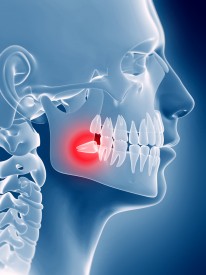Wisdom Tooth Pain

Wisdom teeth develop close to the point of eruption anytime from a person’s teenage years to nearly 30 years of age. Some people may go for years without even the hint of a problem, and wake up the next day to pain that radiates through the entire side of the face. Not all wisdom teeth cause pain, but for a large percentage of adults, wisdom teeth are much more susceptible to toothaches caused by a variety of complications.
What To Do
As soon as you begin to experience any type of discomfort or pain in your mouth, you should contact a dentist. The earlier the condition is examined and addressed, the fewer complications a person will need to experience. Your dentist will:
- Take a panoramic x-ray to assess the eruption patterns and jaw structure.
- Conduct a clinical exam to check the areas where teeth are erupting.
- Advise you whether or not treatment or medication is needed.
- Address your discomfort / pain that you are experiencing.
In most cases, your dentist will recommend removing the affected wisdom tooth. This can be done fairly comfortably thanks to options like sedation dentistry. The type of procedure will depend on the shape and location of your wisdom tooth, so an examination is a key step that should be taken advantage of in a relatively quick time frame.
Potential Causes
The primary cause of wisdom tooth pain is due to infection or impaction of the tooth. Even if a tooth is beginning to erupt on its own, it can cause serious complications that result in discomfort or damage to the other teeth throughout the mouth. What causes these problems in the first place is usually due to:
- Teeth erupting sideways or at an angle.
- Inadequate space in the mouth.
- Curvature of the jaws or lack of jaw length.
- Eruption cysts around the developing wisdom tooth.
- Swelling due to infection around the wisdom tooth.
- Food and bacteria packing into the eruption site opening.
- Inability to keep the area clean, due to a partially erupted tooth.
Even if your wisdom tooth begins to break through the gum tissue, it is susceptible to infection and decay. Teeth that are not able to erupt fully are often prone to bacteria entering under the gum tissue around the newly erupted tooth. This bacteria seeps deep underneath the gum “pocket” and can cause infection not only to the wisdom tooth, but to the teeth adjacent to it. As a result, intermittent swelling and pain can develop.
Risks Of Not Treating
Neglecting any area of infection in your mouth, especially wisdom teeth, can cause serious complications that will not go away on their own. Rather, these risks will simply develop into more chronic conditions that produce daily discomfort rather than intermittent toothaches. By not addressing wisdom tooth pain, a person can begin to develop:
- Pain
- Infection
- Swelling
- Damage to adjacent teeth
- Cysts in the bone and bone loss
- Crowding of other teeth, caused by the pressure of the wisdom tooth
- Tooth decay
- Periodontal disease, which causes bad breath and tooth loss
Just a single tooth with infection or decay can easily become multiple teeth with the same condition, if the initial cause is not quickly treated. In fact, untreated wisdom teeth can continue to cause discomfort for several years until the patient decides it is finally time to move forward with treatment to relieve their pain.
Benefits Of Treating
Addressing wisdom tooth pain as early as possible can help preserve the oral health that you’ve worked so hard to maintain. By removing the area of infection or decayed wisdom tooth, the cause of the pain can be eliminated. This also prevents a chain reaction from taking place in the teeth next to the wisdom teeth. What was a single wisdom tooth with gum disease or tooth decay can easily “jump” to the next tooth, causing it to develop bone loss and cavities. Removing the problematic wisdom tooth not only helps you eliminate discomfort, it preserves the rest of your smile. Most patients have fully recovered from their extraction procedure within 1-2 weeks.
Alternative Treatments
The only option other than having wisdom teeth removed is to treat infection with antibiotics and attempt at keeping the area as clean as possible. Unfortunately, repetitive use of antibiotic therapy can cause drug resistance and is not regarded as an effective treatment for eliminating wisdom tooth complications. Oral hygiene aids are limited in their ability to clean around the wisdom teeth due to their location and frequent partial impaction, simply delaying the inevitable.
Wisdom tooth pain can make you miserable for days. Just when you think it’s gone, it comes back again. If you’re experiencing swelling, soreness, or off and on pain, it’s time to ask your dentist about your wisdom tooth needs.


